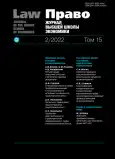Regulatory Guillotine in Russia and its Quantitative Results
- 作者: Knutov A.1, Plaksin S.1, Sinyatullin R.1, Chaplinskiy A.1
-
隶属关系:
- HSE University
- 期: 卷 15, 编号 2 (2022)
- 页面: 4-27
- 栏目: Legal Thought: History and Modernity
- URL: https://journal-vniispk.ru/2072-8166/article/view/318174
- DOI: https://doi.org/10.17323/2072-8166.2022.2.4.27
- ID: 318174
如何引用文章
全文:
详细
The article is devoted to the implementation of the regulatory guillotine in Russia, when the government abolished many legal acts containing regulatory requirements that entered into force earlier than January 1, 2020. The article reveals the concept and procedure for the implementation of the regulatory guillotine, and also presents its results. The aim of the study was to assess the results of the regulatory guillotine in terms of real changes in government regulation. The analysis of the changes was quantitative. As part of this analysis, the authors assessed the impact of the regulatory guillotine on the lists of legal acts enforced by the inspection authorities. The authors compared legal acts from such lists (relevant for February 2020) with the lists of legal acts that fell under the regulatory guillotine. The study made it possible to conclude that out of 11.6 thousand normative legal acts and documents canceled according to official data during the guillotine, only 1/10 of them were really checking during the inspections and supervision activities of the authorities. Such a low efficiency is explained by the fact that among the regulations that were enforced during the inspections and supervision activities in February 2020, 70% of acts were excluded from the regulatory guillotine due to the rules of the guillotine itself, 6% of acts were forgotten, 9% of acts were included in the “white list” for preservation actions and only 15% of the acts were canceled. The study also revealed a number of problems in the implementation of the regulatory guillotine: lack of an appropriate stage of system design of the target regulation model; limited competence of working groups on the implementation of the regulatory guillotine; a significant number of areas for which the regulatory guillotine has not been applied; removal from the regulatory guillotine of the mandatory requirements established by federal laws. The authors proposed to extend the project of the regulatory guillotine, focusing efforts on deregulation on certain areas that are most burdensome for the entrepreneurs.
作者简介
Alexander Knutov
HSE University
编辑信件的主要联系方式.
Email: aknutov@hse.ru
ORCID iD: 0000-0003-1595-0466
Senior Research Fellow, Institute of State and Municipal Administration
Sergey Plaksin
HSE University
Email: splaksin@hse.ru
ORCID iD: 0000-0002-8203-8832
Deputy Director, Institute of State and Municipal Administration, Candidate of Sciences (Economics)
Ruslan Sinyatullin
HSE University
Email: rsinyatullin@hse.ru
ORCID iD: 0000-0003-3105-6106
Analyst, Institute of State and Municipal Administration
Alexander Chaplinskiy
HSE University
Email: noreply@hse.ru
ORCID iD: 0000-0002-4972-5032
Senior Research Fellow, Institute of State and Municipal Administration, Candidate of Sciences (Law)
参考
- Scott J. (2005) The regulatory Guillotine Strategy. Preparing the Business Environment in Croatia for Competitiveness in Europe. Washington, US Agency for International Development, pp. 4-5. Available at:https://pdf.usaid.gov/pdf_docs/PNADG614.pdf(дата обращения: 19.04.2021)
- Artemenko E.A. (2021) Regulatory guillotine: analysis of draft new regulatory structures. Voprosy gosudarstvennogo i munitsipal'nogo upravleniya = State and Municipal Management, no. 1, pp. 30-55 (in Russ.)
- Chambers D., McLaughlin P., Stanley L. (2019) Regulation and poverty: An empirical examination of the relationship between the incidence of federal regulation and the occurrence of poverty across the US state. Public Choice, vol. 180, no. 1-2, pp. 131-144.
- DOI:https://doi.org/10.1007/s11127-018-0603-8
- Golodnikova A. Ye., Yefremov A.A. Tsygankov D.B. (2021) Under the sign of the “regulatory guillotine”: how to break the vicious circle of deregulation and re-regulation? Zakon = Law, no. 2, pp. 105-117 (in Russ.)
- DOI:https://doi.org/10.37239/0869-4400-2021-16-2-105-117
- Kim Jong Seok et al. (2008) Case Studies of Reform Implementation Experience: Regulatory Transformation in Korea. Washington: Foreign Investment Advisory Service, pp. 18-19.
- Klovach E.V., Pecherkin A.S. et al. (2020) Regulatory guillotine in the field of industrial safety. Bezopasnost' truda v promyshlennosti = Safety of Industrial Labor, no. 11, pp. 21-28 (in Russ.)
- Krasheninnikov P.V. (2020) Regulatory guillotine cannot be put at the forefront in administrative reform. Zakon = Law, no. 6. pp. 8-12 (in Russ.)
- Letunovsky V.V., Ageev A.A. (2021) Implementing regulatory guillotine. Administrativnoye pravo i protsess = Admistrative Law and Process, no. 1, pp. 34-42 (in Russ.)
- DOI:https://doi.org/10.18572/2071-1166-2021-1-34-42
- Lyubimov Yu., Novak D., Tsygankov D. et al. (2019) Regulatory guillotine. Zakon = Law, no. 2, pp. 20-36 (in Russ.)
- Martynov A.V. (2019) Prospects for using mechanism of regulatory guillotine in the reform of control and supervision activities. Vestnik Nizhegorodskogo universiteta = Nizhnyi Novgorod University Journal, no. 5. pp. 143-165 (in Russ.)
- Nozdrachev A.F., Starodubova O.E. (2021) “Regulatory guillotine” as a decisive factor in the effectiveness of state control (supervision). Zhurnal rossiyskogo prava = Journal of Russian Law, vol. 25, no. 1, pp. 170-175 (in Russ.)
- DOI:https://doi.org/10.12737/jrl.2021.014
- Pavlov P.N. (2020) Influence of regulatory rigidity of legal framework on the dynamics of poverty in the regions of Russia. Voprosy ekonomiki = Issues of Economy, no. 12, pp. 62-79 (in Russ.)
- DOI:https://doi.org/10.32609/0042-8736-2020-12-62-79
- Salamatov V. Yu., Mostynets E.A. (2020) World and Russian practice of regulatory guillotine. Biznes. Obshchestvo. Vlast' = Business. Society. Power, no. 4. pp. 107-112 (in Russ.)
- Tsygankov D.B., Golodnikova A.E., Efremov A.A. et al. (2018) Regulatory policy in Russia: key trends and architecture of the future. Available at: URL:https://publications.hse.ru/mirror/pubs/share//direct/219490174(accessed: 07.02.2019) (in Russ.)
- Tsypkina I.S. (2019) On expediency of implementing mechanism of the “regulatory guillotine” in relation to labor legislation. Vestnik Universiteta Kutafina = Journal of Kutafin University, no. 11, pp. 77-82 (in Russ.)
- DOI:https://doi.org/10.17803/2311-5998-2019-63-11-077-082
- Zaloilo M.V. (2020) Fragmentation as a modern trend in the development of the legal space. Pravo. Zhurnal Vysshey shkoly ekonomiki = Law. Journal of the Higher School of Economics, no. 1. pp. 27-49 (in Russ.)
- DOI:https://doi.org/10.17323/2072-8166.2020.1.27.49
补充文件








